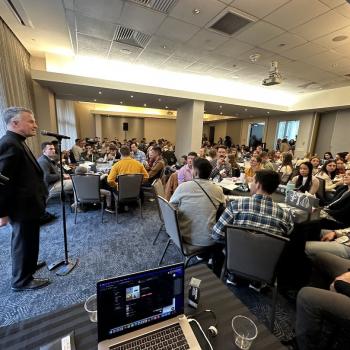For such abuses as well as theological reasons, Protestants rejected purgatory, penance, and other Gregorian innovations at the Reformation. This no doubt makes you wonder why I'd devote an entire sermon to Gregory the Great, seeing that this is a Protestant preaching portal. The reason is that had it not been for Gregory, chances are there would be no Protestants because there would have been no medieval Catholicism to protest because there would have been no Christianity at all, at least not in the western world.
Christianity began as a counter-cultural movement infiltrating the Roman Empire following the resurrection, and became legitimized under Emperor Constantine in the 4th century. While helping to effectively spread the gospel throughout the known world at that time, being wedded to Rome dangerously tied the stability of the church to the stability of the Empire. When just a century later Germanic barbarians sacked Rome, the church was threatened with extinction too. Pope Leo the Great, bishop of Rome when western imperial power was crumbling, did manage to talk Attila the Hun out of completely leveling the city. But Leo's successors, Popes Hilarius and Simplicius respectively, were unable to prevent further decay. A series of schisms, government incursions, feckless bishops, and ongoing barbarian invasions almost obliterated Christianity in the west. Only a lack of unity among its enemies kept Italy and its churches from being reduced to dust. Only a lack of unity, that is, and Gregory the Great.
Gregory grew up during the Ostrogoth invasions that kept Rome in chaos. In order to help restore order, Gregory later became Rome's chief administrative official, for what that was worth. But eventually he gave that up to become a Benedictine monk. Presuming that little was left of life as he knew it, he preferred to devote what was left to contemplation and prayer. About that time a Germanic tribe known as the Lombards were organizing another onslaught against Rome. This was about the same time that a flood devastated Roman grain reserves and unleashed a citywide epidemic. Gregory was summoned out of his contemplative life by Pope Pelagius II. Using his old administrative skills, Gregory coordinated sanitation, buried the dead, and fed the hungry. But then Pelagius became ill and died. Given the dire state of affairs, no one in their right mind would have wanted to take over the papacy, so Gregory got saddled with that too. He tried to refuse it, but once it was his, he took it as his calling.
Energized by his passionate faith, Gregory cared for Rome's poor and suffering through a massive redistribution of wealth. "It is by no means enough not to steal the property of others," he wrote. "You are in error if you keep to yourself the wealth which God has created for all. He who does not give to others what he possesses is a murderer. He is a killer who keeps for his own use what he would provide for the poor . . . When we share with those who are suffering, we do not give what belongs to us, but what belongs to them. This is not an act of pity, but the payment of a debt."
Gregory took measures to guarantee wheat shipments from Sicily, supervised the rebuilding of aqueducts, and drilled the garrison guarding the city until morale was restored. He then opened negotiations with the Lombards and made peace. Once some semblance of social stability was sustained, Gregory proceeded to rid the church of corrupt, egocentric priests who were just in it for the prestige that state-sanctioned religious status provided. Gregory wrote about how "Weak-minded people are frequently diverted toward pursuing exterior happiness when the breath of popular favor accompanies their good actions. They give up their own personal choices, preferring to remain at the mercy of whatever they hear from others. Thus, they rejoice not so much to become blessed but to be called blessed. Eager for praise, they give up what they had become to be; and so they are severed from God by the very means by which they appeared to be commendable in God."
Of all the popes between Constantine and the Reformation, none was more influential then Gregory. A prolific writer, teacher, and preacher, Gregory diligently invested himself in the spiritual welfare of the enormous flock under his care. He founded a school for the training of church musicians, and Gregorian chant is named for him. Fervent about evangelism, Gregory sent missionaries to England to root out paganism there, which paved the way for Christianity in the English speaking world. His sermons on the gospels, published in 591, circulated for hundreds of years. Among his sermons still circulating is one for the Feast of St. Thomas.
Thomas, for many the patron saint of doubt, was actually—like Gregory—among the most courageous of the disciples. When Jesus announced his intention to visit the graveside of Lazarus, the rest of the disciples demurred, saying, "Are you sure you want to go back there? The last time you went there they tried to stone you!" But Thomas stepped up. He said, "Let's go too so that we may die with him." After the resurrection, Jesus appeared to his frightened, disloyal, and disbelieving disciples who were hiding out behind locked doors. But Thomas wasn't there. The gospels don't tell us where Thomas was, but you have to score him points for venturing outside while the rest of his buddies took cover. "We have seen the Lord," they said when Thomas returned. But Thomas refused to believe it until he saw Jesus for himself. Once Thomas did see the resurrected Christ, authenticated by his visibly scarred hands and side, Thomas humbly worshiped Jesus as his crucified Lord and God.





